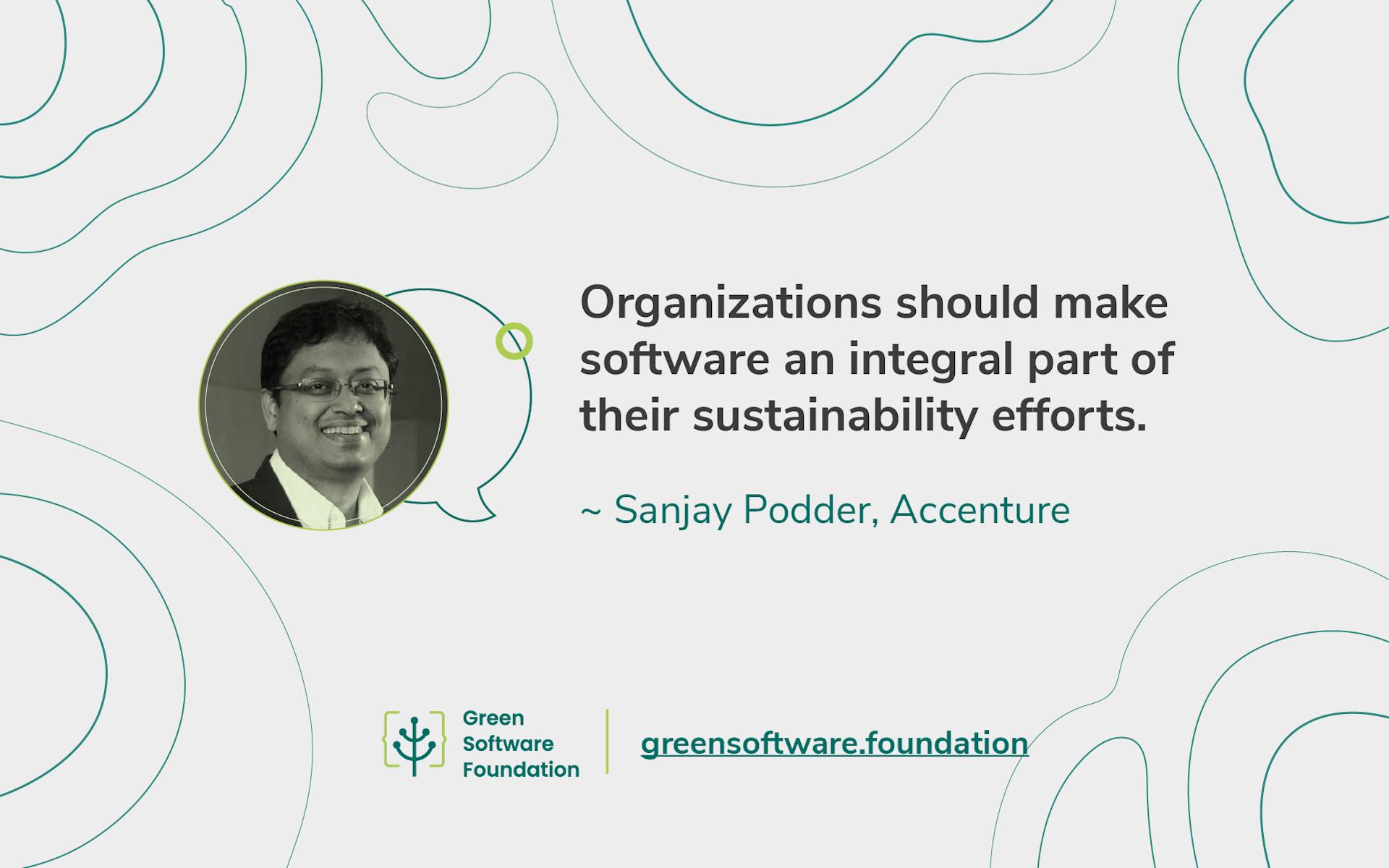Tell us about your role at Accenture
I am the Global lead for Sustainable Technology at Accenture and drive thought leadership and innovation in this area. I am also responsible for establishing and developing our technology capabilities offerings and for embedding sustainability best practices in technology delivery.
I have spent close to 20 years in Accenture delivering complex DevOps projects for clients and half of which in leading Innovation in Software DevOps and AI space. My deep understanding of software engineering led the way for me to become the Global Software Engineering R&D lead for Accenture. I have also bagged more than 50 patents in Software Engineering over the years. I strongly believe that software can accelerate the attainment of Sustainable Development Goals (SDG). That is why I founded the Tech4Good program at Accenture. In recognition of the transformational projects I have led under the Tech4Good program, I was selected as an Eisenhower Fellow in 2017. As an Eisenhower Fellow, I embarked on a six-week program in the U.S. where I conducted research related to scaling the impact of how technology can be used to solve complex social problems together with other 20 fellows named in 2017.
Tell us about your journey to the Green Software Foundation
The rising greenhouse gas (GHG) emissions from ICT has been an area of concern for me. And I have been spearheading the Green Software culture and program at Accenture in my current role as the Tech Sustainability Innovation lead. This brought me closer to like-minded people from organisations like Microsoft who have a shared commitment to green software.
As an innovator, I am very passionate about bringing digital technologies to develop innovative solutions to achieve SDGs. Decarbonizing digital technologies is my current area of innovation.
My road to GSF is both personal as well as a corporate level interest. I believe at the heart of all technologies is software. With green software, we will all be able to move closer to our sustainability goals. This belief has driven me to begin research on green software. As a result, in 2020, I wrote an article—How Green is your Software?—for the Harvard Business Review.
Early in 2021, as I was researching the green software development space, I came across some work from Jeff Sandquist and his team at Microsoft. We connected and quickly realised that we were both asking the same question; trying to solve the same problems. We knew we wanted to collaborate. We needed to engage with organisations that shared a commitment to sustainability. That was how the idea of the Green Software Foundation (GSF) was conceived.
What do you, as an individual, expect to achieve by working with the GSF and in green software in general?
On its own, software doesn’t consume energy or emit any harmful discharge. The problem lies in the way software is developed for use, and then in the way it is used. Software runs on hardware, and as the former continues to grow, so does its reliance on the machines to make it run. This in turn impacts the carbon footprint.
This is why organisations should make software an integral part of their sustainability efforts. They need to take the carbon footprint of software into account in the way it is designed, developed, and deployed.
One critical challenge in developing green software is that there are no commonly agreed standards, practices, metrics and tools to measure and minimise software related carbon emissions. We will need new skills, new tools and new standards as well as a collaborative effort from business, academia, regulators, and nonprofits.
I would like to see the building of a vibrant, inclusive, trusted ecosystem of people where we share industry-wide recognized standards, innovation, tooling, and best practices for green software engineering.
What obstacles do you see to the cause of green software? How do you think we can overcome them?
I see three major challenges in this space at the moment:
One challenge is understanding green software and the role it plays in the sustainability agenda. I think a lot of people in the industry agree that we need to do something collaboratively to curb the amount of carbon emitted into the environment. However, what many are not aware of is the how.
Many have focused on hardware in the past and it is now time to focus on software. But what is considered green and exactly what is green software? This is where the work of the Green Software Foundation becomes crucial in building this awareness.
Skill sets for green software is another challenge. This is a very new area. Many software developers and engineers lack the knowledge or the avenues to learn and develop expertise to be able to put Green Software Engineering into actual practice.[5] Hence, we, at Accenture, through collaborations with the Green Software Foundation and our partners, created a set of training for our software developers and engineers so that we can champion and put Green Software Engineering in practice. To date, we have trained about 40,000 software engineers across Accenture.
Another challenge is the lack of standards and tools. As I said earlier, this is a very new area. We are the pioneers in this space. There are no commonly agreed standards, practices, metrics and tools to measure and minimise software related carbon emissions. We will need new skills, new tools and new standards and we will need a collaborative effort from all stakeholders.
An industry consortium like the Green Software Foundation is crucial in setting industry standards and creating innovative tools like the Carbon Aware SDK. In this aspect, Accenture has also developed patent pending assets and tools which helps our clients in achieving their environmental social and governance (ESG) goals. We also participate actively in the GSF Innovation Working Group which will create more innovative and useful tools for the industry and our partners.
Any other matters you would like to share with us about green software and sustainability initiatives?
As organizations are putting more focus on sustainability and it becomes a more urgent cause, we at Accenture, are bringing together the best in technology and human ingenuity to enable our clients tackle their greatest sustainability challenges. Green Software is one of the initiatives that will help reduce greenhouse gas emissions.
Recently, we brought together members of the Green Software Foundation to discuss how green software engineering can accelerate decarbonization at the Accenture COP26 event.
Summing up the mood, Prof Ziliang Zong of Texas State University commented that “Green computing has been led by the hardware industry for decades. Now it’s our turn in the software industry to make a significant contribution to the world in terms of sustainability.”
Read interviews with other Steering Committee Members
Dan Lewis-Toakley of Thoughtworks
Elise Zelechowski of Thoughtworks
Erica Brescia formerly of GitHub
Jose Lopez Diminguez of Globant
Santiago Fontannarosa of Globant
This article is licenced under Creative Commons (CC BY 4.0)

